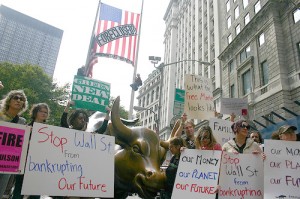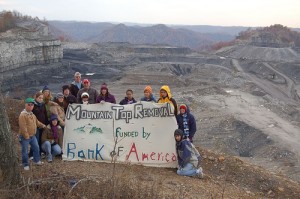 Why are people occupying Wall Street? And can this protest lead to real change in how banks treat people?
Why are people occupying Wall Street? And can this protest lead to real change in how banks treat people?
Over the last two weeks I’ve watched momentum build in lower Manhattan as growing numbers of people are physically drawn together to express their deep frustration with the financial system.
The Occupy Wall Street (OWS) demonstrators camped out at Zuccotti Park (renamed Liberty Plaza) and marching across Brooklyn Bridge are a diverse set, with many different priorities. But there are some clear, underlying concerns that are bringing everyone together to protest the influence of Wall Street over our nation’s policies. For me, these are some of the very same principles that underline RAN’s campaigns to stop the banking sector from underwriting the destruction of our planet and the poisoning of our communities. For example:
Fraud. Whether it’s Ponzi schemes, rogue traders or sub-prime lending, we’re fed up with banks committing fraud in pursuit of profits. Time after time we’re exposed to a systemic disregard for the law in this sector. It therefore no longer shocks me when banks happily lend billions of dollars to industries like the coal mining industry, which repeatedly flouts safety and environmental laws to maximize profits.
Income gap. Exorbitant CEO bonuses, salaries and golden parachutes are a place to direct frustration about he fact that the U.S. has the widest (and still widening) inequality gap of any industrialized nation. The top .01 percent makes an average of $27 million per household, as the average income of the bottom 90 percent makes an average of $31,244. (There’s a useful explanation of how this happens here.)
Personal impact. Those profits and salaries for the .01 percent come at the expense of foreclosed homes, lost jobs, and skyrocketing student debts coupled with diminishing prospects of employment. Add to that list: the personal and community impacts of oil spills, polluting coal plants, and mining disasters. Again, these impacts are hitting hardest on those who have the least.
 So where does RAN’s bank campaign fit into protests like OWS? Matt Taibbi, writing in Rolling Stone, says it well:
So where does RAN’s bank campaign fit into protests like OWS? Matt Taibbi, writing in Rolling Stone, says it well:
“The end game of any movement against Wall Street corruption is going to involve some very elaborate organization. There are going to have to be consumer and investor boycotts, shareholder revolts, criminal prosecutions, new laws passed, and other moves.”
Right now Occupy Wall Street is making people aware of the battle lines. RAN supports the occupiers and is committed to the longterm organizing that Taibbi speaks of. Ready to get organized and take action on Wall Street banks? Stand with us and get active in our campaigns and those of our allies to revoke the charters of the worst corporations, to pressure the biggest banks to stop propping up the most polluting industries, and to demand a new bottom line.